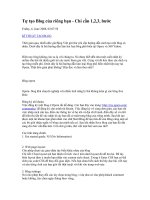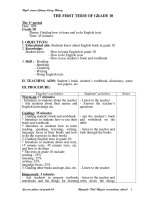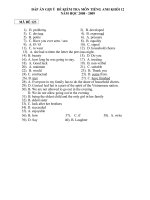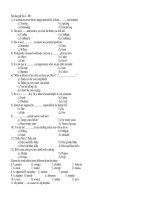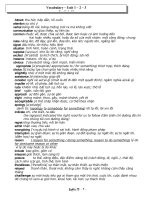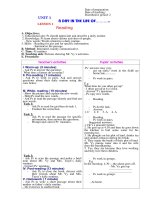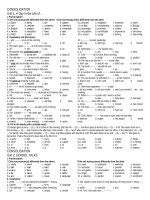GRAMMMAR OF UNIT 1 + 2+ 3 TA 10
Bạn đang xem bản rút gọn của tài liệu. Xem và tải ngay bản đầy đủ của tài liệu tại đây (121.42 KB, 4 trang )
PAST TENSES
Tense
IV. SIMPLE
PAST
(quỏ kh n)
V. PAST
PROGRESSIVE
(quỏ kh tip
din)
VI. PAST
PERFECT
(quỏ kh hon
thnh)
Form
Examples
E.g 1: Mary saw that film last
night.
E.g 2: His uncle lived in Hanoi 5
years ago.
Usages
1.
E.g 3: Dien Bien Phu battle
happened in 1954.
2.
E.g4. She came in, took off her
hat, and sat down.
3.
E.g.5: I often went fishing when I
was young.
E.g.6: I used to be afraid of dogs.
*Adverbs:
.
.
..
..
E.g 1: Tom was watching TV at
this time last night.
I was reading book at 8 last
night.
4.
E.g 2: The tourist lost his camera
while he was traveling around the
city
2.
E.g 3: While my mother was
cooking, my father was fixing his
car last night.
*Adverbs:
.
.
E.g1:
I had done all my homework
before 4p.m yesterday.
3.
E.g: When they arrived, we had
gone to the movies.
The police came after the
robber had gone away.
2. ..
..
1.
1
..
..
Cách thành lập thì quá khứ đối với động từ hợp quy tắc.
- Nếu động từ là một phụ âm, ta thêm 'ed"
To return -------- returned
To help -------helped
- Nếu động từ tận cùng là "e" ta chỉ thêm "d" vào sau động từ đó
To live -------- lived
To create -------- created
To die -------- died
- Nếu động từ đọc lên có một âm tiết ta gấp đôi phụ âm cuối rồi thêm "ed" nếu đứng tr ớc
phụ âm cuối là một nguyên âm. .
To hop -------- hopped
To rub -------- rubbed
- Tuy nhiên ta không gấp đôi phụ âm cuối đối với những phụ âm: w, x, y
To bow -------- bowed
To mix -------- mixed
To play -------- played
- Đối với từ đọc lên có hai âm tiết tận cùng bằng một phụ âm đứng trớc là nguyên âm thì ta
chỉ gấp đôi phụ âm khi từ đó đợc nhấn vào âm tiết thứ hai.
To prefer -------- preferred ( ta nhấn vào âm sau của động từ)
To visit -------- visited ( ta nhấn vào âm đầu của động từ vì vậy ta không gấp đôi phụ âm
"t"
- Nếu động từ tận cùng là "y" đứng sau là một phụ âm, ta đổi "y" thành "i" và thêm 'ed".
To worry -------- worried
To carry -------- carried
- Nếu V tận cùng là 'y", đứng trớc là một nguyên âm thì ta thêm "ed" vào sau động từ đó mà
không cần đổi "y" thành "i"
To play -------- played
To annoy -------- annoyed
Supply the correct verb forms: (Simple past and Past Perfect tenses)
1. They (go) ..home after they (finish).their work.
2. She said that she (already, see)..Dr. Rice.
3. When we came to the stadium, the match (already, begin).
4. They told me they (not, eat) such kind of food before.
5. He (ask)..why we (come) so early.
6. After they had gone, I (sit)down and (rest)
7. Before she (watch)..TV, she (do).her homework.
8. After taking a bath, he (go)..to bed.
Give the correct tenses of verbs in brackets: simple present or simple past
1. He (practice).the piano every day.
2. John (write). his report last night.
3. Guillermo (call) his employer yesterday.
4. It (not rain)much in our country in winter.
5. John (hate) smoke.
6. Tim (go). to France last year.
7. Lan (drink) two bottles of water every
day.
8. Mr. and Mrs. Ba (take). some beautiful photos a few days ago.
9. What .you (do). last weekend?
10. Where you (spend) your summer holiday last year, Tam?
GRAMMAR OF UNIT 2
A.WH- QUESTIONS: ( Cõu hi vi nhng t hi)
Mt s cõu hi thng c bt u vi t hi l: WHO, WHOSE, WHEN, WHERE, WHAT, WHY, WHICH,
HOW, HOW MUCH, HOW MANY, HOW FAR, HOW HIGH, HOW LONG,.....
I. Question word used as subject: ( T hi dựng lm ch ng)
Loi cõu hi ny cú cu trỳc nh sau:
Question word + V + ......
Eg: - Who answered the phone yesterday?
- Where is he now?
- What happened here yesterday?
II. Question words used as objects or modifiers: ( T hi dựng lm tõn ng hay b ng)
Cu trỳc thụng thng ca loi cõu hi ny l:
Question word + Auxiliary verb + Subject
+ Main verb + ......?
Notes: 1. Cỏc tr ng t thụng thng l: be, have, do, hoc cỏc ng t khim khuyt ( Modals )
Eg: - What did you do?
- Where are John and Bob staying now?
- When will they leave for Saigon?
- How long have they been staying here?
- Who does she want to meet?
- Why was she shouting at you?
2. Khi Be l ng t chớnh trong cõu hi, nú c t trc ch ng.
Eg: - What are these things?
- Where is the supermarket?
3. Nu cú nhiu tr ng t, ta ch t tr ng t u tiờn trc ch ng.
Eg: - How long will the film have been made?
- Why hasnt the contract been signed yet?
B. INFINITIVES AND GERUNDS
I.Gerunds:
1. As subject:
e.g. Reading French is easier than speaking it.
Collecting stamps is my hobby.
2. Verbs + V-ing
avoid (trỏnh), admit (tha nhn), advise (khuyờn nh), consider (xem xột), delay (trỡ hoón), deny (t chi), discuss
(tho lun), dislike (khụng thớch), enjoy (thớch), finish (hon thnh), keep (tip tc), mention ( cp), mind
(phin , ngi), miss (nh , b l), postpone (trỡ hoón), practice (luyn tp), quit (ngh, thụi), recommend (nhc
nh), suggest ( ngh), understand (hiu)
+ cant help (ko th trỏnh / nhn c )
+ cant stand ( ko th chu ng c )
+ cant bear ( ko th chu ng c )
+ It is no use / It is no good ( vụ ớch )
+ would you mind (cú lm phin ..ko)
+ to be used to ( quen vi )
+ to be / get accustomed to (dn quen vi )
+ to be busy ( bn rn )
+ to be worth ( xứng đáng )
+ to look forward to (trông mong )
+ to have difficulty / fun / trouble
+ to have a difficult time
3. GO + V_ing: E.g. go shopping; go fishing; go swimming…
4. Verbs + Preposition + V_ing:
+ Approve of
+ depend on
+ object to
+ appologize for
+ dream of
+ rely on
+ believe in
+ give up
+ succeed in
+ care for
+ insist on
+ think of/ about
+ consist of
+ keep on
+ worry about ……………
E.g. Sue is thinking of selling his motorbike.
5. After preposition + V_ing
6. When reducing a time clause (khi rút gọn mệnh đề chỉ thời gian)
E.g: He continued to speak while walking down the path.
After leaving the house, he went to the
restaurant.
II. INFINITIVES:
II.1. To- infinitives:
1. as Subject
E. g: To act like this is childish.
2. Verbs + to-inf
agree (đồng ý); arrange (sắp xếp); ask (hỏi, yêu cầu); beg (nài nỉ, van xin); decide (quyết định); demand (yêu
cầu); deserve (xứng đáng); expect (mong đợi); fail (thất bại); hope (hi vọng); learn (học); manage (sắp xếp); mean
(ý định); offer (đề nghị); plan (lên kế hoạch); prepare (chuẩn bị); pretend (giả vờ); promise (hứa); refuse (từ chối);
seem (dường như); threaten (đe doạ ); volunteer (tình nguyện); wait (đợi); want (muốn); wish (mong)….
3. Adjectives + to-inf
Able, afraid, amused, annoyed, anxious, ashamed, boring, careful, certain, content, crazy, curious, dangerous,
difficult, eager, easy, good, bad, glad, happy, lucky, (im)possible, ready, slow, sorry, thankful…
4. After “what, where, when, why, which, how…”
E. g: I don’t know where to go and what to buy.
She asked me how to operate this lift.
5. Used to express purpose
E.g: Laura has gone to town to do some shopping.
6. Verbs + Object + to –inf
advise (khuyên); allow(cho phép); ask (yêu cầu); beg (van xin); challenge (thách thức); convince (thuyết phục);
encourage(khuyến khích); expect (mong đợi); forbid (cấm); force (buộc); hire (thuê); instruct (hướng dẫn); invite
(mời); order (ra lệnh); permit (cho phép); persuade (thuyết phục); remind (nhắc nhở); require (đò hỏi); teach
(dạy); tell(bảo); urge (thúc giục) ; want (muốn); warn (báo trước)….
7. After: anything, anybody, something, someone, somebody, nothing…
7. In some structures:
- It + take + O + time + to-inf
e.g. It took me 2 hours to do this.
- S + V + enough + noun + to- inf
E.g. We have enough money to buy a new house.
- S + be + adj + enough + to-inf
E.g. She is old enough to ride a motorbike.
- S + be + too + adj + to-inf
E.g. The tea is too hot to drink.
- It + be + adj + (for O) + to- inf
E.g. It is necessary for us to study hard.
II.2. BARE INFINITIVE
1.After a modal verb: can, could, may, might, must, will, shall, should, …
2. After “had better, would rather/ would sooner, rather than”
E.g. We’d better not be late.
I didn’t enjoy it. I’d rather have stayed at home.
3. Let / help / make / have + S.O + V- ( bare infinitive )
E.g. The man made me fill in the form.
I had my brother carry my suitcase .
4. After “except, but” (ngoại trừ)
E.g: As for the housework, I do everything except cook.
Notes:
1. Một số động từ chỉ tri giác theo sau là động từ nguyên mẫu hoặc V-ING ( nếu đang xảy ra )
see
watch
smell
notice
observe
hear
feel
taste
E.g. I saw them play football. (toàn bộ sự việc)
I saw them playing football. (1 phần sự việc)
2. Get +O + to-V
e.g. I got my brother to carry my suitcase .
3. Một số động từ theo sau bởi to-inf và V-ing mà không khác nhau về nghĩa: start, begin, like, love, continue,…
4. advise/ allow/ permit/ recommend + V-ing
advise/ allow/ permit/ recommend + O + to-inf
5. Một số đôngj từ theo sau bởi to-inf và V-ing với nghĩa khác nhau
*) remember/ forget
+to V : nhớ/ quên việc phải làm e.g. Did you remember to give the documents to Mr. Brown?
+ V-ing: nhớ/ quên việc đã làm e.g. I don’t remember meeting him before.
*)regret :
+ to V: rất tiếc(khi thông báo một tin xấu….)
e.g. We regret to inform that you have failed.
+ V-ing: hối tiếc, tiếc nuối về một việc đã làm trong quá khứ e.g.We regret wasting so much time when we were
students.
*) Stop:
+ to V: ngừng việc này để làm một việc khác
e.g. We stopped to buy some food. W have driven for 2 days.
+ V-ing: ngừng hẳn việc đang làm
Smoking is harmful. You should stop smoking.
*) Need: + to V: (mang nghĩa chủ động) e.g. He needs to buy a computer.
+ V-ing: (mang nghĩa bị động)
The computer needs repairing.
*) Try: +to V: cố gắng làm gì
e.g. He has just lost his job. He tries to find another one.
+ V-ing: thử làm gì
He tries giving up smoking but he cannot.
Exercise:
1. I am looking forward to (see) ………………………. you.
2. He dreads (have) ……………………... to retire.
3. I arranged (meet) ……………………….. them here.
4. He urged us (work) ………………..…. faster.
5. I wish (see) …………………….. the manager.
6. It's no use …………………………. (wait).
7. He warned her (not touch) ……………………..…. the wet paint.
8. Don't forget (lock) ……………….…. the-door before (go) ……………………. to bed.
9. My mother told me (not speak) ………………..…. to anyone about it.
10. I can't understand her (behave) ………………………. like that.
11. He tried (explain) …………………….. but she refused (listen)…………………..…. .
12. I am prepared (wait) ……………….……. here all night if necessary.
13. Would you mind (show) ……………….……. me how (work)………………… the lift?
14. After (walk) …………..…. for three hours we stopped to let the others (catch up) ………………. with us.
15. I am beginning (understand) ………………. what you mean.
16. The boys like (play) …………………. games but hate (do) ……………..……. lessons.
17. I couldn't help (overhear)…………….……. what you said.
18. He surprised us all by (go) ……………..……. away without (say)……………..…. 'Good-bye'.
19. The government agreed (allow)……………………the refugees over the border.
20. The customer officer refused (let)…………………him into the country.
21. She decided (sit)……………………at the rear of the boat.
22. They promised ( return)…………………the equipment they had borrowed.
23. They threatened (deport)………………………her on the next flight.
24. We have arranged (meet)……………………outside the school at 4.30.
25. I’m sorry. I meant (write)……………………to you, but I’ve been busy.
26. Have you finished (fill)………………….in that form?
27. Have you ever consider (buy)…………………….a new house?
28. Would you mind (show)………….me your passport, sir?
29. They denied (enter)………………the country illegally.
30. We suggested (go)……………….together to visit the museum.
31. I really miss (play)………………….tennis.
32. I like (cook)…………………., but I also enjoy meals out at restaurant.
33. Remember (phone)……………………..me tomorrow.
34. As you’re so tired, I don’t think you need (come)……………………..tonight.
35. Have you ever stopped (wonder)……………………why she behaves like that?
36. Do try (make)…………less noise. I’m learning.
37. I regret (say)………that I won’t be able to come to the party.
38. After two months without work, he regretted (leave)……………………his job at the bank.
39. The teacher permits us (go)………………….. out in a minute.
40. Tell him (come)………. to see me at once.
